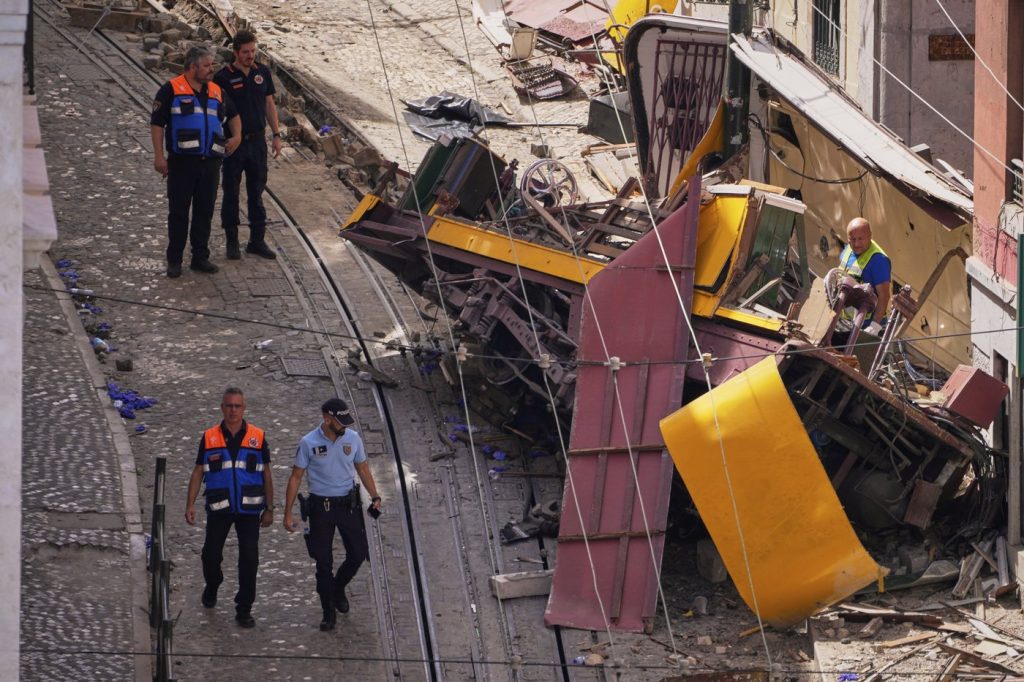LISBON, Portugal (AP) – Investigators are examining the debris from a funicular that derailed in downtown Lisbon on Wednesday, resulting in the tragic deaths of 16 people and injuring 21 others, five of whom are in critical condition. The incident occurred during peak summer tourist season, raising serious concerns about safety protocols.
The attorney-general's office in Portugal confirmed the identification of eight victims, which includes five Portuguese nationals, two South Koreans, and one Swiss individual. Investigators indicated that there is a strong likelihood that the deceased also includes two Canadians, one American, one German, and one Ukrainian, according to Luís Neves, the head of the national investigative police. Identification of three victims remains ongoing.
The injured individuals represent a diverse group, with nationalities including Spaniards, Israelis, Portuguese, Brazilians, Italians, and French. Global Affairs Canada has acknowledged awareness of two missing Canadians in Lisbon and stated that consular officials are in communication with local authorities for further information.
The popular tourist attraction, Elevador da Gloria, typically attracts long lines of visitors eager to experience its short yet picturesque journey up one of Lisbon's steep hills. Prime Minister Luis Montenegro described the derailment as “one of the biggest tragedies of our recent past” as the nation observed a day of mourning on Thursday. Montenegro, along with President Marcelo Rebelo de Sousa and Mayor Carlos Moedas, attended a somber Mass at the Church of Saint Dominic, which drew hundreds of attendees dressed in black.
In his sermon, Patriarch Rui I of Lisbon reflected on humanity's reliance on machines, suggesting that the funicular had betrayed that trust in this catastrophic event. The funicular, powered by steel cables, has been in operation since 1914 and is capable of carrying over 40 passengers. On Thursday, officials conducted detailed inspections of the site, including the examination of cable systems beneath the tracks.
Current investigations have not confirmed whether a malfunctioning brake or a snapped cable contributed to the funicular's uncontrollable descent, leading it to crash into a building. Mayor Carlos Moedas emphasized the need for answers, while cautioning that discussions regarding potential causes are merely speculative.
The national investigation offers collaborative efforts from police, public prosecutors, and government transport experts. An independent agency is expected to conduct a thorough examination as well. The operating company, Carris, has initiated its own investigation, reporting that a full maintenance program for the funicular was completed last year and highlighting daily visual inspections.
As of Thursday, the death toll had been reported as 17 before being corrected to 16 due to a duplication in reporting. Margarida Castro Martins, head of Lisbon’s Civil Protection Agency, stated that all decedents were adults, and the identification process for three victims necessitates access to dental records or family DNA from abroad, according to Francisco Corte-Real of the National Forensic Medicine Institute.
The transport workers’ union confirmed that the funicular's brakeman, André Marques, was also a victim of the incident. The injured individuals range in age from 24 to 65, including a 3-year-old child, and represent multiple nationalities. Eyewitness accounts describe horrific scenes as the funicular derailed, with one tourist recounting hearing a significant crash just after arriving at their hotel.
The Elevador da Gloria, a vital part of Lisbon's cultural heritage, halted operations alongside other historical funiculars for urgent safety inspections. European Union flags in Brussels flew at half-mast as condolences poured in from various EU leaders. The tragic accident has ignited a distribution of concern over tourist safety in the region, sparking calls for stricter safety regulations in tourist transport systems across the city.












